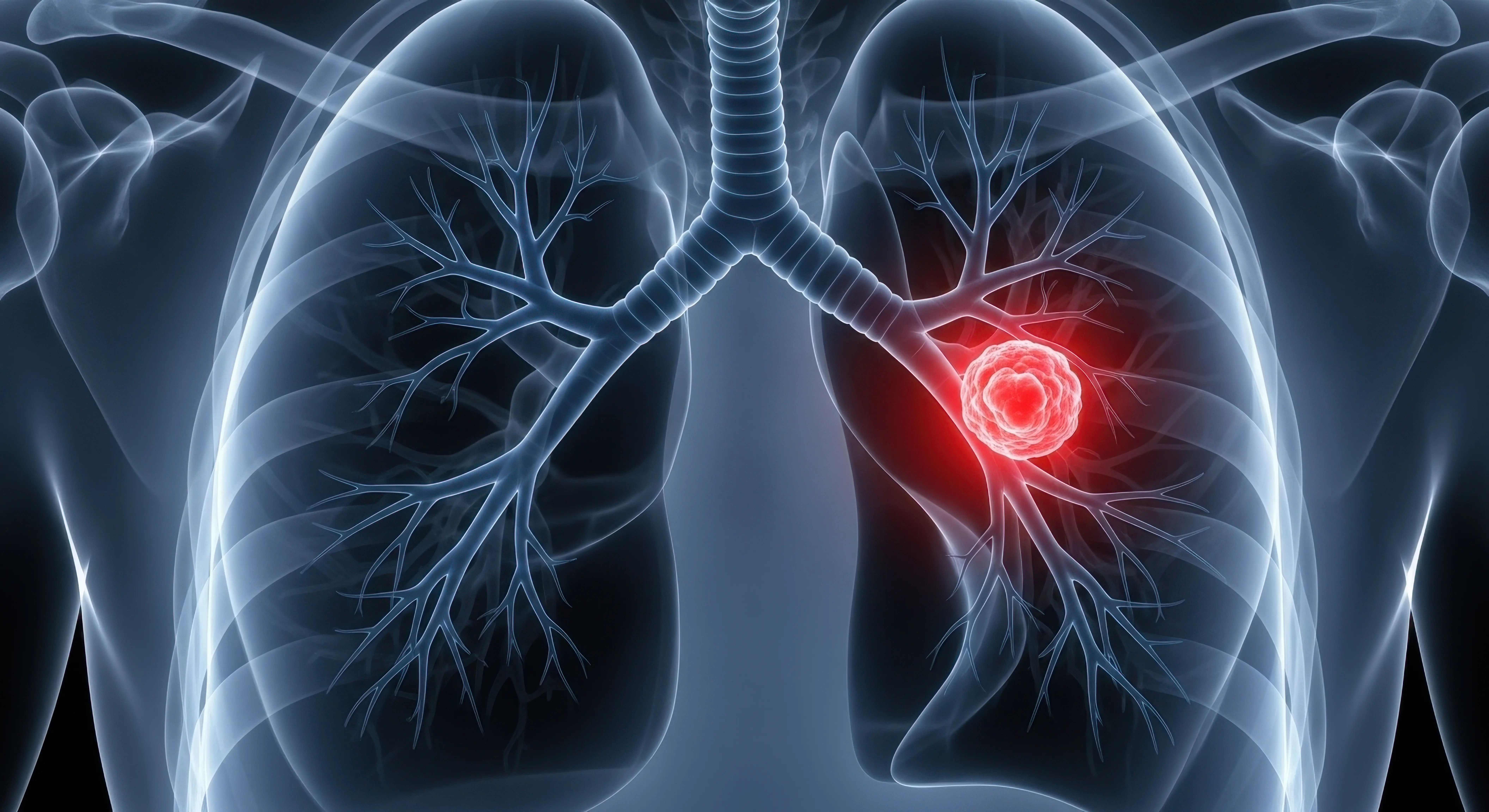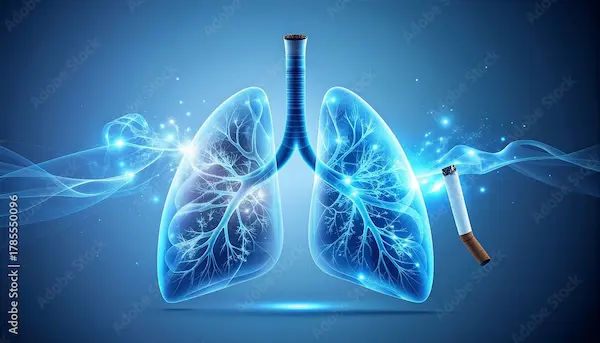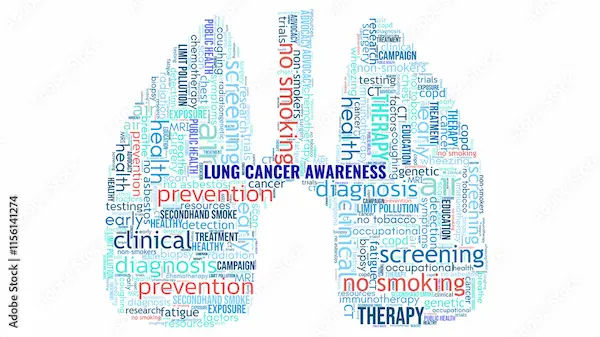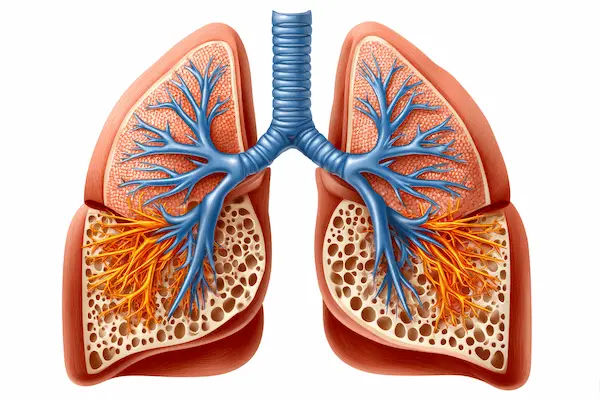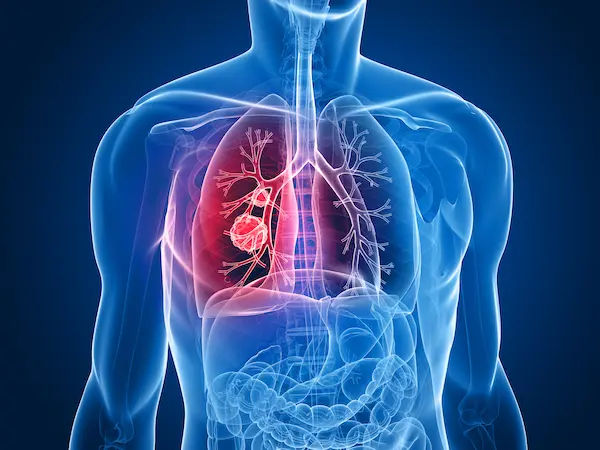Don't Ignore the Whisper A Visual Guide to Early Lung Cancer Signs
Know about lung cancer, how early detection helps, the big five early signs, who is at risk and what to do next.

Written by Dr. J T Hema Pratima
Reviewed by Dr. Dhankecha Mayank Dineshbhai MBBS
Last updated on 13th Jan, 2026
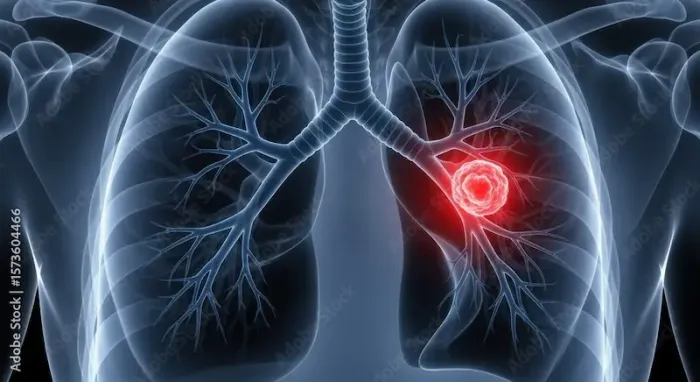
Introduction
Lung cancer is often thought of as a silent disease, with symptoms only appearing at advanced stages. But is that always true? The reality is that your body often sends subtle, early signals—a persistent whisper you shouldn't ignore. Recognising these initial signs can be the critical difference that leads to early diagnosis and more effective treatment options. This guide cuts through the confusion, offering a clear, visual roadmap to the early warning signs of lung cancer.. Whether you're a long-time smoker, have never touched a cigarette, or are simply health-conscious, this article will empower you with knowledge. We'll cover the most common symptoms, the lesser-known systemic signs, key risk factors, and the crucial steps to take if something feels off.
Why Early Detection of Lung Cancer is a Game-Changer
Catching lung cancer in its initial stages dramatically alters the treatment landscape and improves outcomes. Understanding this "why" is the first step in taking any symptom seriously.
Consult a Top Oncologist for Personalised Advice
The Survival Rate Difference: Early vs. Late Stage
The statistics are stark but important. According to the American Cancer Society, the 5-year survival rate for lung cancer that is diagnosed while it is still localised (confined to the lungs) is significantly higher than for cancer that has spread to other organs. Early detection opens the door to more treatment options, including curative surgery. When the disease is advanced, treatment often focuses on managing the cancer and improving quality of life rather than eliminating it. This survival rate difference is the single most compelling reason to be aware of early symptoms.
The Challenge: Why Early Signs Are Often Missed
The early signs of lung cancer are frequently missed or dismissed for two main reasons. First, they are often non-specific and mimic common ailments like a cold, bronchitis, or the natural effects of ageing or being out of shape. A nagging cough might be blamed on allergies, and fatigue on a busy schedule. Second, in its earliest stages, a small lung tumor may not cause any symptoms at all. It's only when it grows and begins to irritate airways, block blood vessels, or invade nerves that the body starts sending signals. This is why knowing the specific nature of these symptoms is so crucial.
The Primary Early Warning Signs of Lung Cancer (The "Big 5")
These are the symptoms most directly linked to the presence of a tumour within the lungs or major airways. Pay close attention to any change in your baseline health.
A Cough That Won't Quit
A cough that persists for more than a few weeks is one of the most common first signs of lung cancer. It's not just any cough, but one that changes character or refuses to go away.
What to Look For: Changes in a Chronic Cough: If you have a "smoker's cough," be vigilant if it becomes deeper, hoarser, or if you start coughing more frequently than usual. For anyone, a new cough that lingers for over two weeks without a clear cause (like a cold) warrants medical attention.
Shortness of Breath: More Than Just Being Out of Shape
Feeling easily winded from activities you used to handle without issue can be a sign of shortness of breath (dyspnea). This happens when a tumour physically blocks a major airway or when fluid from a tumour builds up in the lining of the lungs (a pleural effusion), making it difficult for the lungs to expand fully.
Chest Pain: Location and Sensation Matter
Lung cancer can cause chest pain that is often dull, aching, and persistent. It may be felt in a specific area of the chest, back, or shoulders. The pain can result from the tumour pressing against nerves or invading the chest wall. It's important to distinguish this from the sharp, crushing pain of a heart attack, but any persistent chest pain should be evaluated by a doctor.
Wheezing or a Hoarse Voice
Wheezing occurs when airways become narrowed or blocked, creating a whistling sound when you breathe. While commonly associated with asthma, it can also be a sign of a lung tumour causing an obstruction. A hoarse voice that lasts for more than two weeks can happen if a tumour affects the nerve that controls the larynx (voice box). This is a key systemic sign that the impact is going beyond the lungs themselves.
Coughing Up Blood (Hemoptysis): A Red Flag
Even a small amount of blood in your phlegm (sputum)—a condition known as hemoptysis—is a significant red flag that requires immediate medical consultation. The blood can appear as streaks or rust-colored phlegm and is caused by irritation or damage to the airways or blood vessels from the tumour.
Beyond the Lungs: Systemic and Less Common Early Signs
Sometimes, the first clues aren't respiratory at all. Lung cancer can cause body-wide (systemic) symptoms.
Unexplained Weight Loss and Loss of Appetite
Losing 10 pounds or more without trying is a classic systemic symptom of many cancers, including lung cancer. Cancer cells consume a lot of the body's energy, and substances released by the tumour can alter metabolism, leading to muscle and fat loss even when you're eating normally.
Persistent Fatigue That Doesn't Improve with Rest
This isn't ordinary tiredness. Cancer-related fatigue is a profound exhaustion that isn't relieved by sleep or rest. It can be caused by the body fighting the disease, anaemia (low red blood cell count), or the metabolic changes mentioned above. If you're feeling tired all the time for no clear reason, it's worth discussing with a healthcare provider.
Recurring Infections: Bronchitis and Pneumonia
If you find yourself battling repeated episodes of bronchitis or pneumonia, it could indicate that a tumour is partially blocking an airway, creating a "dead space" where infections can easily take hold. The lung tissue behind the blockage cannot clear secretions properly, becoming a breeding ground for bacteria.
Are You at Risk? Understanding the Key Risk Factors
Knowing your risk profile helps contextualise the symptoms. Even if you have a low risk, awareness is key.
Smoking: The #1 Risk Factor Explained
Cigarette smoking is the leading cause of lung cancer, responsible for the vast majority of cases. The risk increases with the number of cigarettes smoked per day and the number of years smoked. However, it's critical to know that lung cancer in non-smokers does occur, often linked to other factors.
Second hand Smoke, Radon Gas, and Occupational Hazards
Second hand Smoke: Inhaling smoke from others' cigarettes increases risk.
Radon Gas: This radioactive gas, which can seep into homes from the ground, is the second leading cause of lung cancer in the U.S. It's odourless and colourless, requiring specific tests to detect.
Occupational Exposure: Exposure to asbestos, arsenic, diesel exhaust, and some forms of silica and chromium can increase risk, especially for smokers.
Family History and Genetics
Having a parent or sibling with lung cancer may slightly increase your risk, which could be due to shared environmental factors or, in some cases, inherited genetic mutations.
What to Do If You Recognise the Signs
When you recognise the signs, then:
Don't Panic, But Do Act: Talking to Your Doctor
If you experience one or more of these symptoms, the worst thing you can do is ignore them out of fear. Schedule an appointment with your doctor. Be prepared to describe your symptoms clearly: when they started, their frequency, and their severity. Mention any risk factors like smoking or family history. Honesty is crucial for an accurate assessment.
What to Expect: The Diagnostic Process
Your doctor will likely start with a physical exam and a chest X-ray. If anything seems suspicious, the next step is often a low-dose CT scan (LDCT), which is far more detailed than an X-ray and is the standard for lung cancer screening in high-risk individuals. If a mass is found, a biopsy (taking a small tissue sample) may be needed for a definitive diagnosis. Apollo24|7 offers convenient home collection for blood tests that can support a general health workup, and their platform can help you connect with specialists for further evaluation.
Conclusion
The early signs of lung cancer are often subtle and easy to attribute to less serious conditions. But your body has a way of communicating when something is wrong. By understanding the "whispers"—the persistent cough, the unexplained fatigue, the slight shortness of breath—you empower yourself to take charge of your health. This guide serves as a starting point for awareness, not a tool for self-diagnosis. Knowledge is power, but action is key. If you recognise any of these signs, especially if you have known risk factors, the most important step is to consult a healthcare professional. If your condition does not improve after trying simple remedies, book a physical visit to a doctor with Apollo24|7 for a thorough evaluation. Taking that step could make all the difference.
Consult a Top Oncologist for Personalised Advice
Consult a Top Oncologist for Personalised Advice

Dr Devashish Tripathi
Radiation Specialist Oncologist
20 Years • MBBS, PLAB, MRCP (UK)- General Medicine, FRCR (Oncology), Certificate of Completion of Training (CCT)- Clinical Oncology
Delhi
Apollo Hospitals Indraprastha, Delhi

Dr. Amit Choraria
Surgical Oncologist
18 Years • MBBS, MS (Surgery) Fellow, Surgical Oncology, Tata Medical Center (FSO) Fellow, European Board of Surgery (Surgical Oncology) (FEBS) Fellow, Minimal Access Surgery (FMAS) Fellow, Indian Association of Gastrointestinal Endosurgeons (FIAGES) UICC Fellow, Royal Marsden NHS, London, UK Visiting Scholar, Plastic Reconstructive Surgery, CGMH, Taiwan Fellow, Robotic Surgical Oncology, Vattikuti Foundation, USA
Kolkata
Apollo Multispeciality Hospitals , Kolkata, Kolkata
(75+ Patients)

Dr. Harsh J Shah
Surgical Oncologist
15 Years • MS, MCh (GI), DrNB (GI)
Ahmedabad
Apollo Hospitals Gandhinagar, Ahmedabad

Dr. Sandeep Muzumder
Radiation Specialist Oncologist
21 Years • MBBS (JIPMER, Pondicherry), MD (AIIMS, New Delhi)
Bhubaneswar
Apollo Hospitals Old Sainik School Road, Bhubaneswar
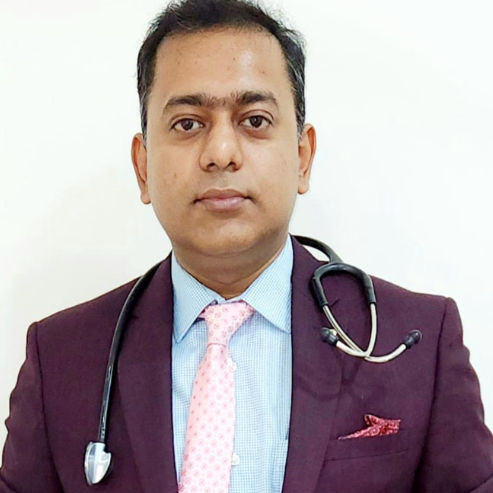
Dr.sanchayan Mandal
Medical Oncologist
17 Years • MBBS, DrNB( MEDICAL ONCOLOGY), DNB (RADIOTHERAPY),ECMO. PDCR. ASCO
Kolkata
Dr. Sanchayan Mandal Oncology Clinic, Kolkata
Consult a Top Oncologist for Personalised Advice

Dr Devashish Tripathi
Radiation Specialist Oncologist
20 Years • MBBS, PLAB, MRCP (UK)- General Medicine, FRCR (Oncology), Certificate of Completion of Training (CCT)- Clinical Oncology
Delhi
Apollo Hospitals Indraprastha, Delhi

Dr. Amit Choraria
Surgical Oncologist
18 Years • MBBS, MS (Surgery) Fellow, Surgical Oncology, Tata Medical Center (FSO) Fellow, European Board of Surgery (Surgical Oncology) (FEBS) Fellow, Minimal Access Surgery (FMAS) Fellow, Indian Association of Gastrointestinal Endosurgeons (FIAGES) UICC Fellow, Royal Marsden NHS, London, UK Visiting Scholar, Plastic Reconstructive Surgery, CGMH, Taiwan Fellow, Robotic Surgical Oncology, Vattikuti Foundation, USA
Kolkata
Apollo Multispeciality Hospitals , Kolkata, Kolkata
(75+ Patients)

Dr. Harsh J Shah
Surgical Oncologist
15 Years • MS, MCh (GI), DrNB (GI)
Ahmedabad
Apollo Hospitals Gandhinagar, Ahmedabad

Dr. Sandeep Muzumder
Radiation Specialist Oncologist
21 Years • MBBS (JIPMER, Pondicherry), MD (AIIMS, New Delhi)
Bhubaneswar
Apollo Hospitals Old Sainik School Road, Bhubaneswar

Dr.sanchayan Mandal
Medical Oncologist
17 Years • MBBS, DrNB( MEDICAL ONCOLOGY), DNB (RADIOTHERAPY),ECMO. PDCR. ASCO
Kolkata
Dr. Sanchayan Mandal Oncology Clinic, Kolkata
More articles from Lung Cancer
Frequently Asked Questions
1. What are the first signs of lung cancer in a non-smoker?
Non-smokers can experience the same early symptoms as smokers, including a persistent cough, chest pain, and hoarseness. However, they may be more likely to initially notice symptoms like shortness of breath or fatigue, as they are less likely to attribute them to smoking-related issues.
2. Can you have early-stage lung cancer with no symptoms at all?
Yes, it is possible, especially when the tumor is very small. This is why screening with low-dose CT scans is recommended for individuals at high risk, as it can detect cancer before symptoms arise.
3. What does a lung cancer cough sound like?
There is no single specific sound, but it is typically a persistent, chronic cough. It may be dry or produce phlegm. The key change is that it is new for you, or a change in a chronic cough you've had, and it doesn't go away.
4. How is lung cancer diagnosed early?
The most effective method for early diagnosis in high-risk individuals is an annual low-dose CT (LDCT) scan. If a symptom prompts a visit, a doctor may start with an X-ray and then move to a CT scan. A biopsy is needed to confirm the diagnosis.
5. Can young, healthy people get lung cancer?
While the risk increases with age, lung cancer can occur in younger people, especially if they have risk factors like smoking, genetic predisposition, or exposure to radon or asbestos.
